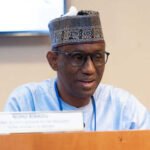President Bola Tinubu ‘not seeing any need’ for the planned nationwide hunger protests in Nigeria is rubbing salt into citizens’ wounds.
Development Diaries reports that the president, through the Minister of Information and National Orientation, Mohammed Idris, appealed to citizens who plan to stage the protests to shelve the plan.
According to the minister, who spoke to journalists after closed-door talks with President Tinubu at the Aso Rock Villa, Abuja, on Tuesday, the nation’s number one citizen also called on other citizens to give his administration enough time to respond to their requests.
‘On the issue of the planned protest, Mr President does not see any need for that. He asked them to shelve that plan and he has asked them to await government’s response to all their pleas’, the minister said.
‘So, there is no need for strike. The young people out there should listen to the president and allow the president more time to see to the realisation of all the goodies he has for them’.
Africa’s most populous country is currently facing an acute cost of living crisis, with inflation soaring, leaving millions in a world of hunger and starvation.
Telling Nigerians that there is no need for the ten-day planned protests, from 01–10 August, against the rising cost of living is a faulty response to their demands. It is like rubbing salt into wounds that are still bleeding and the flesh torn apart.
Citizens plan to stage constitutionally guaranteed protests because they believe that the government does not appear to be taking sufficient action to address their suffering. At this time, President Tinubu and his communication handlers need to be empathetic in their response to aggrieved Nigerians.
In response to the planned protests, Mr President should speak directly to the Nigerian people. This is not the time for name-calling, blame games, or referring to the planned protests as the work of the opposition parties. It is about the Nigerian people.
Development Diaries calls on President Tinubu to listen to the demands of Nigerians, and ensure that they are not denied their constitutionally and internationally guaranteed right to peaceful protest.
As for the handlers of the president’s communications, they must ensure that they constructively engage citizens on the issues.
We also call on state governors to speak directly to the people and let them know what they are doing to address hardship in the country. They must reassure citizens with concrete results of the government’s response to the economic crisis, not promises.





